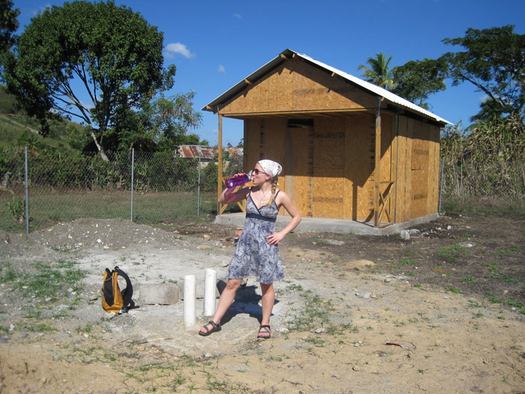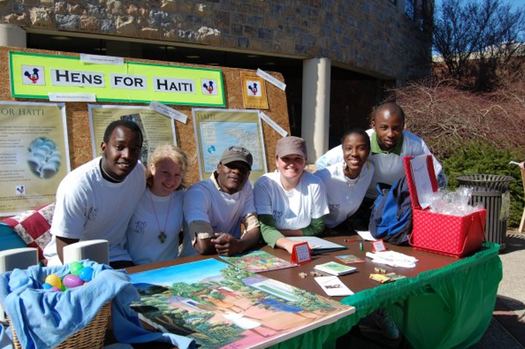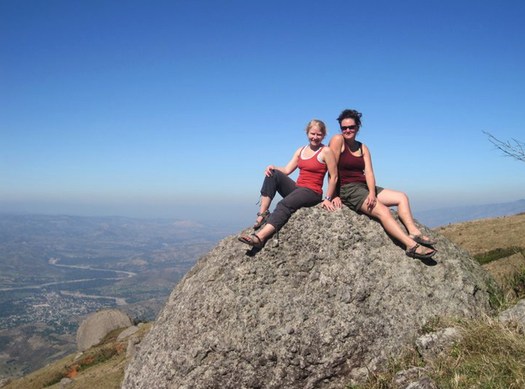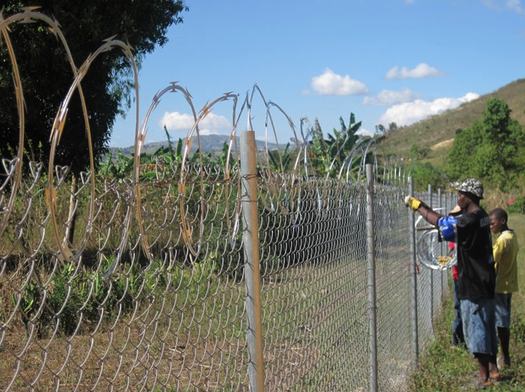Cameron Varano & Hens for Haiti

Cameron during one of her trips to Haiti.
Some people write checks when they see desperation in the world. Others are able to lend a hand.
Cameron Varano is the latter.
In 2009 the 24-year-old Niskayuna resident helped create the Hens for Haiti project, an initiative to build a hen house in Gros-Morne, Haiti. The goal is to bring jobs, nutrition and hope to the community and they're making progress.
The hen house is being constructed and the chicks are supposed to arrive in the spring, but like many projects in developing nations, Hens for Haiti has encountered some speed bumps along the way.
 The Hens for Haiti Virginia Tech group.
The Hens for Haiti Virginia Tech group.
Cameron and her friend Christie Newman (who has a degree in animal and poultry sciences) were students at Virginia Tech when they started Hens for Haiti. The student organization raised over $40,000 dollars and was awarded a 2010 Outstanding Commitment Award from the Clinton Global Initiative.They have since become an independent project.
Christie is currently in Haiti.
Cameron just returned from a two-week trip there and took a few minutes to talk with me about the project and how things are going.
Why chickens?
Growing anything in Haiti is really difficult. If you look at any of the pictures online of farms you'll see that they're struggling just because of the deforestation. Crops wash out and there's also no top-soil, so if you don't have healthy soil, you won't have healthy plants. If you don't have healthy plants you won't have healthy food to feed, so agriculture, in the vegetation sense is very difficult. The people who are tackling deforestation in Haiti are making 50-100 year commitments - these are commitments that will likely outlive their lifetime. I really applaud them; wood is really precious in Haiti so you have to put in big strong trees to support your smaller life, but you also have to hire people just to guard your trees, so that's a problem that I wouldn't even begin to know how to tackle.
Hens, poultry was a great choice because you can get the feed, you can contain the chickens in a relatively small area and an egg is a really great protein and food source as a whole. Protein deficiency is certainly heavily prevalent in Haiti. Eggs are a food that Haitians are familiar with so you're eliminating a lot of those cultural barriers that you would have to get across by choosing a food that's already there. It's also really easy once we get the facility up and running to offer a better product and I just mean our chickens will be vaccinated and they will be kept healthy; we'll keep them in a clean facility and the egg will be sold at a better price so once it catches on hopefully it's going to spread like wildfire.
You were a nutrition major; how does that help with this project?
Haiti is so malnourished so really any nutrition is good nutrition to a certain degree. If we talk about the egg as a whole protein, what effect it has on the human body, those are things that I can help with. My degree has a focus on community nutrition so that comes in more when we talk about creating the forums for the market women, so even if we're not talking nutrition, a lot of my background is talking to people in that setting and changing behaviors and habits in a community setting which is a lot more psychology. That's the secret behind nutrition; nutrition is psychology. Foods are all habits, and breaking those habits are more mental barriers than a physical barrier. So that's the skill set I bring, Christi brings her vast wealth of knowledge of poultry. It's huge, I've learned so much about chickens in the last four years.
What are your fundraising goals?
For the hen project we're about $20,000 away from our financial goal of around $68,000. Though that number has just increased, the river has just washed out near our hen facility and it separates the marketplace from our hen facility. Our project is structured so that we will have the egg laying facility run by a business manager and a facility manager and there will be several technicians to help the lead agriculture person; there will also be a security guard. The people we'll sell to are the local market women who already sell eggs. They currently import eggs from the neighboring Dominican Republic and for a pallet of eggs, which is probably about 4 dozen, it's 30 Haitian dollars. And then those pallets are then broken down and they're sold individually egg by egg. But since they're buying a more expensive egg, and a more expensive egg is being sold to the community of Gros-Morne, the goal is to sell to those market women and not just individuals and hope that they will sell at a lower cost.
Some people write checks when they want to help people. Why did you decide to help people this way?
I'm very much a hands on person I love networking, I love going out and meeting people, I love getting things accomplished so for me it's enjoyable - despite the cold showers, despite the sometimes frustrating cultural differences it's still really enjoyable and something that I get a lot out of and learn a lot about myself from. The first time I volunteered internationally - it was the winter of my sophomore year of college I went to the Dominican Republic with an organization that was just a student organization and I went for two weeks and came home and said I want to go for the whole summer. It was all or nothing. I left the day after classes got out and came back the day before classes started. I'm kind of an all or nothing personality.
Writing a check is one of the most efficient ways to help; sometimes donors are like "I want to do more but I'm not in a place right now where I can." There's one fact in the world; money makes the world go 'round so people shouldn't feel guilty or feel like they're not doing enough. If anything they're helping me do what I want to do.
 Cameron and Christie with Gros-Morne in the background.
Cameron and Christie with Gros-Morne in the background.
So where is the project right now in terms of progress?
The facility isn't ready quite yet. In poultry the biggest thing you're fighting is disease. So if one chicken gets sick it's really easy for them to spread disease, so disease containment is really important. You want to get all of your chickens at the same time so they all have the same vaccinations, so they've all been exposed to the same things - you're not introducing anything new into the mix that would throw off the balance. With 1500 hens, we need to bring them all into the barn at once. So, the barn needs to be completely built and it also has to then be rat-proofed. Rats are huge carriers of disease so it needs to be completely closed in and not have any gaps in the seals and then we'll also need to have our technicians on board so that they're able to stay in there and keep the nesting boxes clean and keeping the floor clean. Also, keeping everything well ventilated but not too cool. So everything has to be in place and the chickens are kind of the icing on top and that's not there yet.
Are your chicks coming from Haiti?
We wanted to get our chicks from Haiti, but there is only one dealer and we haven't gotten good reports about him. We invest a lot of money into the chicks and if they die then you just killed your project in a really expensive way and we couldn't take that risk. We would like to deal locally as much as we can; we can have farmers raise the chicks that we can then buy from them later. But right now that doesn't exist so we have to import our chickens but the food is bought from a local food factory in G'onari which is the closest big city and it's actually run out of a company out of Miami. But unfortunately there's no other option.
How will you get the chicks there?
Because 1500 hens is so much to transport we're looking at ways to transport our hens safely so that we can divide it into thirds and we can transport hens into groups of 500 which is a bit more of a manageable number. The Jamaican Broilers Group has wanted to get into Haiti but poultry practices aren't what they need to be for that to happen yet so they've been investing a lot into grassroots education and small farmers and we fall under that category. So they're going to fly in our chicks on a private plane, which is a huge deal, that way they wont die in customs.

What are some of the other challenges you've faced?
Lots of times pay is not negotiated ahead of time, so you ask people - whether you need water or materials transported - and they're helping you and when they're about halfway done they start arguing with you about what you're going to pay them. That is always amusing to me; and even if you negotiate ahead of time we'd still have people come back and still try to negotiate. So, pay is just a cultural difference that in my mind is really difficult to get past.
The other big difficult thing is education - re-framing peoples' mind, the goals of the project and the purpose of the project. I mentioned disease is the biggest issue in poultry, no one who is not clean can be let into the facility grounds once the chickens are in - it's fenced in. We need to make sure they're not carrying any sort of mud on their boots that could have something that could be harmful to the chickens. We need them to wash off. Conveying those ideas and the importance of them to people who are so used to functioning in survival mode is difficult.
For them it's about today and not tomorrow, but our project has a goal for the future. It's not the citizen of Haiti's fault - they've been living this way for the past 200 years so changing that is another huge challenge. On the flip side, in the US - changing peoples perceptions of Haiti is really hard. Mostly the things you see on TV are small sections of Port-au-Prince. Port-au-Prince is by no means an accurate representation of the rest of Haiti - the rest of Haiti is rural and not urbanized. There are violence issues but not to the extent that there are in Port-au-Prince. So changing peoples perceptions in the United States of Haitians and the country is difficult.
Do you want to raise your own chickens one day?
I do like the idea of having fresh eggs on your own; so we'll see. Maybe we'll have our own eggs someday.
I do love gardening and I loved gardening before this so I always wanted to be in North Carolina in a fairly mild climate, and a good growing season - I love goats. There are a lot of goats in Haiti and that would be another good project to start - goats. Christi and I are both thinking of that as a next project, either that or rice. Rice fields are so pretty. Maybe chickens, though. They're fairly stupid animals - you have to be careful, you have to look out for their well-being because often they won't look out for themselves but at the same time, once you have a good facility set up then they're easy to take care of.
You've invested a lot of time and money into this project; what is it about the Haitian people that has you coming back?
I always come back from Haiti a better person, and not how I expect going into it. In a country that literally has almost nothing - the only thing they can have is a plethora of hope.
____
If you'd like to donate to Hens for Haiti, you can go through the Religious of Jesus and Mary and specify that your donation would like to go to the Hens for Haiti project, or you can contact Cameron directly: cameron.varano@gmail.com
This interview has been edited and condensed.
All photos courtesy Cameron Varano.
Hi there. Comments have been closed for this item. Still have something to say? Contact us.
Comments
Wonderful article - wish everyone bon chance and send a check! Hens for Haiti is HOT!
... said Lauren Darman/aka Uncle Laurie on Mar 3, 2011 at 4:52 PM | link